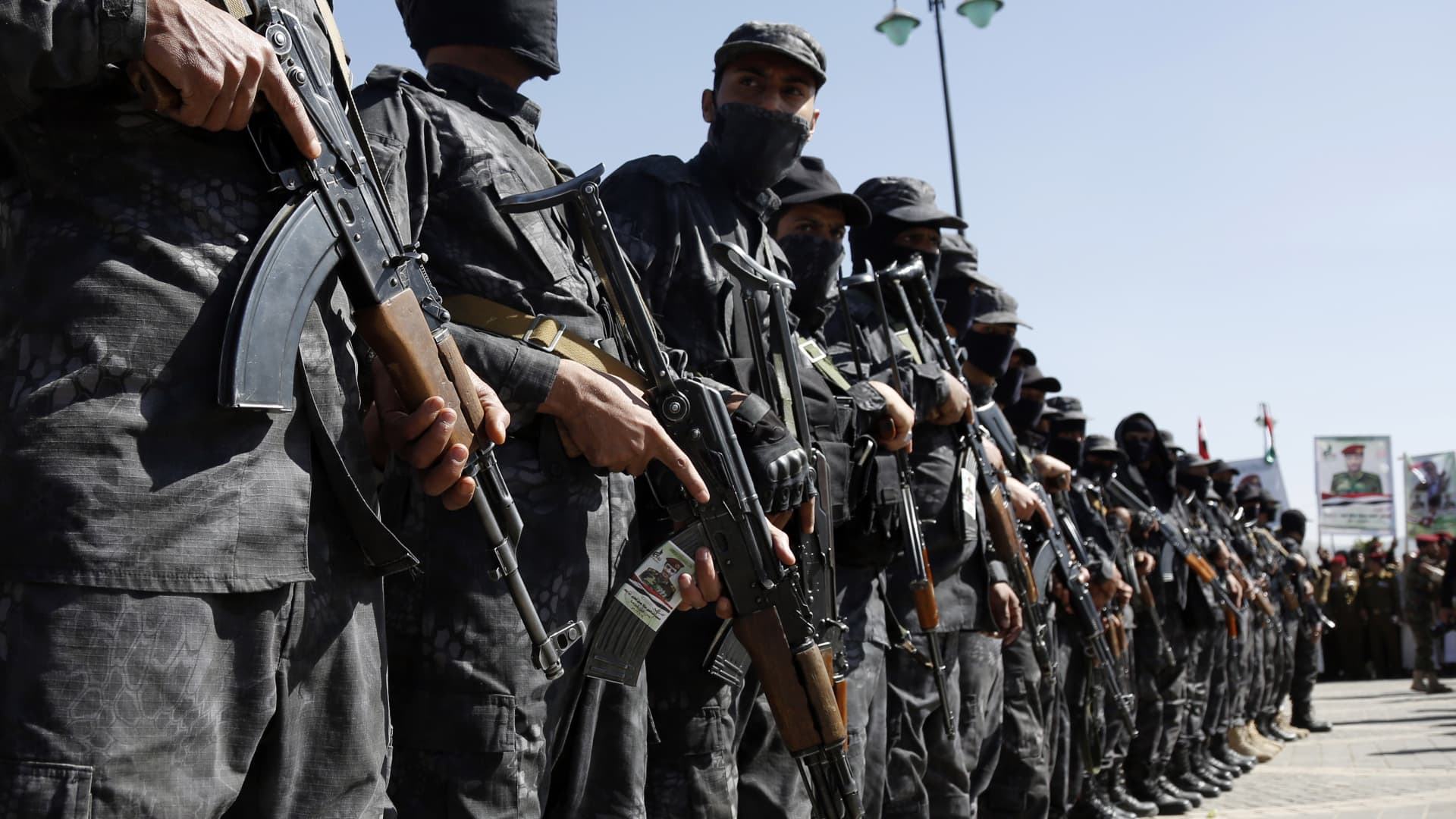SANA’A, YEMEN – DECEMBER 03: Members of the Houthi-run Military Special Forces guard during a funeral procession of Houthi fighters at Al-Sha’ab Mosque on December 03, 2023 in Sana’a, Yemen. (Photo by Mohammed Hamoud/Getty Images)
Mohammed Hamoud | Getty Images News | Getty Images
U.S. and U.K. forces have carried out airstrikes against Houthi rebel targets in Yemen in response to repeated attacks by the Iranian-backed group on ships in the Red Sea.
The U.S. Air Force on Thursday launched strikes on over 60 targets at 16 Houthi militant locations, including missile launch sites, production facilities and radar systems, according to the U.S. Central Command.
It said more than 100 precision-guided munitions were used in the strikes, which reportedly killed at least five people and wounded six.
“U.S. military forces — together with the United Kingdom and with support from Australia, Bahrain, Canada, and the Netherlands — successfully conducted strikes against a number of targets in Yemen used by Houthi rebels to endanger freedom of navigation in one of the world’s most vital waterways,” President Joe Biden said.
The strikes come after the Houthis defied a warning to stop targeting international maritime vessels in the Red Sea, which has wreaked havoc on global trade.
Who are the Houthis of Yemen?
The Houthis, officially known as Ansar Allah or “Supporters of God,” are a militia group named after their founder, Hussein Badr Eddin al-Houthi.
Formed in the early 1990s, the Houthi movement seeks to promote the rights of the Zaydi branch of Shiite Islam and rose to prominence as Arab Spring protests swept the region in 2011.
Three years later, the Houthis took over Yemen’s capital of Sanaa and seized control over much of the north of the country. It prompted a broader conflict with Saudi Arabia, Iran’s regional foe, which has since culminated in a situation in Yemen that the U.N. has described as “the largest humanitarian crisis in the world.”
SANA’A, YEMEN – DECEMBER 02: Yemenis recently militarily trained by the Houthi movement holding up their guns and Palestinian flag chant slogans during an armed popular parade held in Al-Sabeen Square to get ready to go and fight Israel in the Gaza Strip, on December 02, 2023 in Sana’a, Yemen. Thousands of Yemenis recently recruited by the Houthi military forces participated in an armed popular parade held to express readiness for heading to the Gaza Strip and fighting with Palestinians against Israel in response to Israel’s war resumption in Gaza. (Photo by Mohammed Hamoud/Getty Images)
Mohammed Hamoud | Getty Images News | Getty Images
Human Rights Watch says the Houthis have carried out “widespread violations of international humanitarian law and civilian harm” since taking over Yemen’s capital in 2014.
“The Houthis still have not taken responsibility for the civilian harm that they have caused to those living in Yemen,” Michael Page, Middle East and North Africa deputy director at Human Rights Watch, said in a statement on Dec. 13.
“Rather than carrying out new war crimes, they should focus on achieving a durable peace in their country,” he added.
The Houthis, which oppose the U.S. and Israeli influence in the Middle East, is not internationally recognized as the government of Yemen but it does control large parts of the country. This includes the Bab el-Mandeb Strait, a crucial maritime chokepoint that connects the Red Sea with the Gulf of Aden.
Yemeni officials have repeatedly said that Iran and the militant group Hezbollah have provided military and financial support to the Houthis, a charge that Iranian and Hezbollah officials have denied.
What next for the Red Sea crisis?
The Houthis have vowed to continue its attacks in the Red Sea following U.S. and U.K. strikes against Yemen, claiming that the U.S. and U.K. will pay a “heavy price.”
“We affirm that there is absolutely no justification for this aggression against Yemen, as there was no threat to international navigation in the Red and Arabian Seas, and the targeting was and will continue to affect Israeli ships or those heading to the ports of occupied Palestine,” Mohammed Abdulsalam, Houthi negotiator and spokesperson, said via Telegram, according to a Google translation.
Houthi attacks on ships traversing in the Red Sea began late last year, drawing international condemnation. The militants claim their attacks in the Red Sea are in response to the ongoing war in the Gaza Strip.
Global markets have been spooked by the escalating tensions that threaten to spread into the broader Middle East region.
A ship transits the Suez Canal towards the Red Sea on January 10, 2024 in Ismailia, Egypt.
Sayed Hassan | Getty Images
The U.S. says nearly 15% of global seaborne trade passes through the Red Sea, including 12% of seaborne-traded oil and 8% of the world’s liquified natural gas trade.
“Everything and nothing has changed overnight with the retaliation from U.S. and allied forces in response to the aggression that we have seen over the past two months now,” Peter Sands, chief analyst at air and ocean freight rate benchmarking platform Xeneta, told CNBC’s “Street Signs Europe” on Friday.
“The tension is still massive in the region. Uncertainty is a huge part of the planning for global supply chains right now,” Sands said.
“I think every shipper should expect still extended transit times [and] much higher freight rates,” he added.
— CNBC’s Joanna Tan & Ruxandra Iordache contributed to this report.
